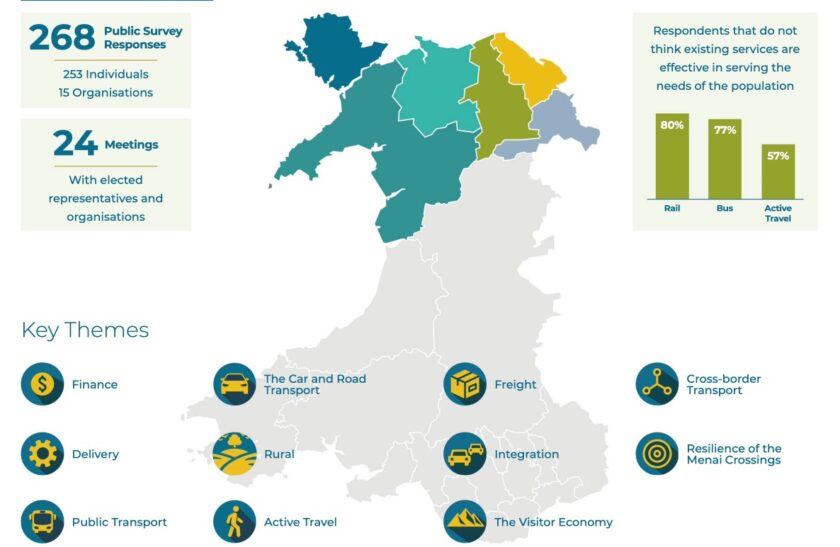57 recommendations to transform local and regional transport as landmark review reports to Welsh Government

A number of proposals and recommendations have been submitted to the Welsh Government that could transform the transport network in North Wales
The North Wales Transport Commission has released its final report, which examines all aspects of travel across the region.
Established in March 2022 by ministers in Cardiff, this independent panel is chaired by Lord Burns, a former Chief Economic Advisor to HM Treasury.
Its task was to investigate the challenges, barriers, and prospects for developing a sustainable, integrated transport system in North Wales.
Emphasising a ‘multi-modal approach’, the commission has evaluated various areas of North Wales, striving to promote a transition from car use to alternative modes of transport in both urban and rural settings.”
The commission operates separately from the Welsh Government’s Roads Review, which led to the abandonment of major road infrastructure projects in North Wales.
Welsh Government promised – and said the works had been funded – for A483 junction improvements, something that was later scrapped. The junctions were seen as key to be enabling elements of the controversial Local Development Plan. Speaking on the scrapped – or permanently ‘paused’ – schemes the report states, “We have undertaken a review of the paused schemes and have identified the following schemes where the active travel components should be considered for further development. These relate to the former A483 Wrexham Bypass J3-J6 scheme, the A55 J14-J16 scheme and A55 active travel crossing closures.
Further on roads the report suggests Wrexham could be a location for an ‘exemplar residential and employment development as part of a Wrexham-wide strategy to reduce motor traffic’, adding, “There are existing routes in urban areas that could be upgraded to prioritise walking and cycling. Where it is safe and appropriate to do so, improvements for active travel could be made by making more efficient use of carriageway space, for example, re-purposing hatched areas of carriageway, and dividing in a different way wide single carriageways and dual carriageways. In addition, physical preventative measures should be introduced at locations where there are important footways on which drivers habitually park.”
“We think that proposals need to be developed for active travel at these locations, recognising that the original proposed active travel components may not be feasible in the absence of the originally proposed scheme. Active travel at these locations needs to be planned and designed to enhance the extent and quality of the overall network of active travel. These schemes need to be promoted by local authorities, Welsh Government’s Strategic Road Network division and NMWTRA.”
Wrexham is recommended to be a pilot location for a public on-street cycle hire scheme, such a scheme could include e-cycles as well as ordinary cycles, they add “Different financial models are available for e-cycle hire schemes and the benefits and disadvantages should be considered as part of scheme development. Schemes could be located at bus and rail stations and interchanges to create mobility hubs.”
Rail is a main element of the report, with different lines being discussed and recommendations put forward.
The Borderlands line is judged as “having potential to provide an important direct connection between the cities of Wrexham and Liverpool and creating an important connection to the North Wales Main Line at Shotton. A station at Deeside would provide access from both Wrexham and Liverpool conurbations to Deeside Industrial Park and would significantly improve access to jobs.”
Investment in England appears key to the success of some rail projects, “The proposals to ease the restriction at Chester Station improve capacity for future electrified services and allow for service frequency and speed enhancements along the North Wales Main Line. Addressing the constraints will also enable better connections to other lines including the Shrewsbury-Wrexham-Chester line. Whilst these improvements require significant investment outside north Wales, they are fundamental to unlocking the proposed North Wales Main Line improvements.”
£90m to £160m of improvements required prior to electrification include signalling between Crewe and Chester, a new platform at Chester, more approaches to the station and new crossovers are all mentioned but no firm funding noted, with some reference to the The Prime Minister announcement in October 2023 proposals for “Network North”.
Similarly the report points to Flintshire County Council’s two applications for Levelling Up funding to UK Government to implement a scheme at the Padeswood Cement Works being unsuccessful, “To ensure this essential infrastructure improvement is delivered, we urge the Department for Transport, in collaboration with Welsh Government, to reconsider this decision and unlock funding for this scheme as a priority” – which would see £35m of works to provide direct access to the sidings from the main line, eliminating shunt moves on the main line.
The Shrewsbury–Wrexham–Chester Line is recommended to increase the passenger service frequency however it notes, “The primary constraint to achieving the desired service frequency and reduced journey times is the current signalling capacity at Gobowen. The estimated cost of addressing this is expected to be in the region of £30 million.
“In addition to the signalling improvements required at Gobowen, we understand that there is an additional capacity constraint between Wrexham and Chester, where the line is currently single-track. Dual tracking this stretch of rail would cost in the region of £60-100 million.”
Transport for Wales get criticised in the report, where they find “Reliability on rail services for north Wales is currently poor, but we expect this to improve as new trains are introduced. A reliable service must be the foundation of attracting people to rail. Stakeholders have noted that the current rolling stock in the region is of poor quality and does not meet the needs of the population. For example, trains operate at capacity during weekends on the North Wales Main Line and the Shrewsbury-Wrexham-Chester Line. This is due to the demand for retail and leisure trips within the region.
Looking forward they add, “TfW is carrying out a phased rolling-out of a new fleet of trains across Wales, which has been subject to some delays. While we understand the reasons behind these delays, we recommend that more consideration is given to re-allocating the rolling stock for north Wales to ensure that enhanced capacity trains are provided for busy services, so that more rail users have a good journey experience.”
The full report can be found here in this 6.5meg PDF file.
The North Wales Transport Commission say, “It is now for Welsh Government to decide how to take forward the recommendations we have made” – which number 57.
“Should Welsh Government accept the recommendations, we have identified a number of priority pieces of work to be progressed at the earliest opportunity. Welsh Government should enable a multi-modal delivery team to provide leadership and coordination within the region to deliver the recommendations of the North Wales Transport Commission. We are aware that some of this work is in progress, and in some cases is well overdue.”
Formally receiving the report Julie James, Minister for Climate Change, said “We will consider the recommendations in detail with the North Wales Corporate Joint Committee. The report provides a strong basis for the development of the Corporate Joint Committee’s Regional Transport Plan for North Wales as well as for taking forward our National Transport Plan.”
“The Commission sets out an ambitious set of proposals, which if implemented successfully will give people who live in north Wales and neighbouring areas new transport choices, with more opportunities to use quality public transport and active travel. Some of the proposals are within our devolved competence, and some are not.
“Naturally we welcome the electrification of the North Wales Main Line – an enhancement Welsh Government has long argued for. However, improving line speeds, unlocking capacity through Chester, and delivering improvements on the Wrexham-Bidston line will deliver more immediate benefits to passengers, as well as supporting modal shift and improving the business case for future electrification.”
On funding the Minister added, “We expect further development work to reinforce that and recognise the important role of the Wales Rail Board in agreeing rail funding priorities for Wales.
“We have therefore asked Transport for Wales to work collaboratively with Network Rail, the Department of Transport, and other stakeholders, to support the development work underway in response to the UK Government’s announcement.”
Spotted something? Got a story? Email [email protected]











